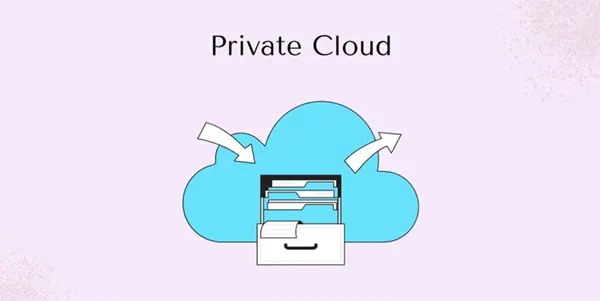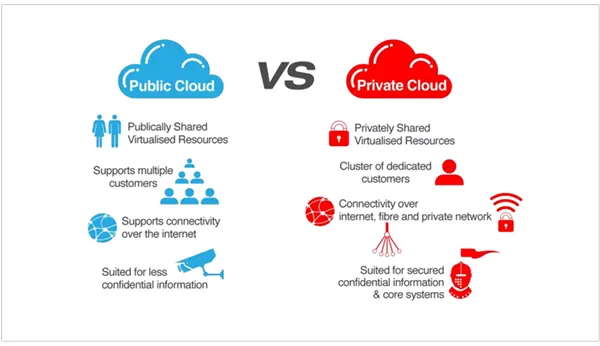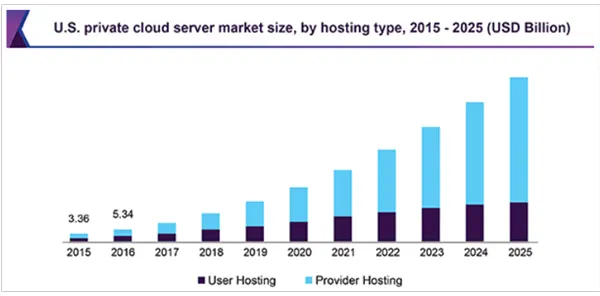
A private cloud is a computing environment that uses shared resources to provide isolated, on-demand, and scalable infrastructure for individual organizations.
Private clouds are typically managed by an in-house IT team or a third-party service provider.
This type of cloud deployment can offer many benefits to organizations, including increased flexibility, improved security, and enhanced control over data and applications.
When considering a private cloud solution, it is vital to weigh the benefits and drawbacks carefully.
Ultimately, the decision to move to a private cloud should be based on a detailed assessment of your organization’s specific needs and requirements.
Some companies deliver flexible managed private cloud services tailored to your budget and business objectives.
How Does a Private Cloud Work?
Private clouds are built on a private network, either on-premises or off-premises.
The main difference between a private cloud and other types of deployment models is that the infrastructure is dedicated to a single organization.
Do You Know?: From 2010 to 2020, the global cloud computing market grew from $24.63 billion to $156.4 billion. That’s a 635% jump.
The organization can completely control and customize the environment to meet its specific needs.
Private clouds are often seen as a more secure option than public clouds, allowing organizations to keep their data and applications behind a firewall.
Also, private clouds can offer better performance and scalability than public clouds, as they are not shared with other tenants.
Public vs Private Cloud

One of the primary decisions you will make when choosing a cloud solution is whether to use a public or private cloud.
Each option has pros and cons, and the best choice for your business will depend on your specific needs and budget.

In 2018, the global private cloud server market size was valued at USD 30.24 billion and is expected to grow at a compound annual growth rate (CAGR) of 29.6% from 2019 to 2025.
Public clouds are operated by third-party service providers, who manage the infrastructure and provide services to customers on a pay-as-you-go basis.
On the other hand, private clouds are owned and operated by a single organization.
Advantages of Private Cloud
The advantages of private cloud are many and varied but can be broadly classified into four key areas:
Cost Efficiency
Private clouds can offer significant cost savings compared to public clouds due to the economies of scale that they can achieve.
In addition, private clouds can be more easily customized to meet an organization’s specific needs, which can further reduce costs.
According to a recent study by Forrester, private clouds can provide up to 60-70% cost savings compared to public clouds.
Nonetheless, the cost of a private cloud is considered relatively high. There are a few reasons behind it, It could be clouds are tailored directly to a client’s needs and preferences.
The expenses might include operating costs. The costs can be predicted during a specific period.
Increased Security and Privacy
Since it belongs to a single client, private clouds can offer increased security and privacy compared to public clouds because they are not shared with other organizations.
Interesting Fact: Nowadays, 80% of companies that adopt the cloud see improvements within their IT departments within six months.
This means that data and applications can be more securely stored and managed and access to them can be more tightly controlled.
In fact, private clouds are seen as being three times more secure than public clouds.
Therefore, the infrastructure of private cloud and systems can be configured to provide high levels of security.
Scalability and Flexibility
Private clouds can be easily scaled up or down to meet the changing needs of an organization and can be quickly adapted to new workloads or applications.
This makes them much more flexible than public clouds.
In contrast, its infrastructure requires an initial investment in hardware and capacity planning.
Further, it often delivers a certain degree of scalability since it is typically constrained by the physical hardware available.
Improved Performance and Quality of Service
Private clouds can offer improved performance and quality of service compared to public clouds because they are not shared with other organizations.
This means that data and applications can be more securely stored and managed and access to them can be more tightly controlled.
Private clouds are becoming an increasingly popular option for organizations of all sizes.
They offer many benefits, including increased flexibility, improved security, and enhanced control over data and applications.
When considering a private cloud solution, it is vital to weigh the benefits and drawbacks carefully and decide based on a detailed assessment of your organization’s specific needs and requirements.
Superior Performance
Private cloud infrastructure is a dedicated infrastructure as it delivers superior performance since they are deployed inside the firewall of the intranet.
Consequently, it ensures efficiency and good network performance.
In Conclusion
As you can see the future of the cloud looks bright. Nowadays, companies are coming to the forefront and choosing to adopt a cloud by seeing associated large and almost immediate benefits.
Owning a private cloud is like having your own, personal data center that is fully managed, promotes easy migration, features a personalized login, and works on a simple and transparent pricing model.
However, they are built using multiple nodes and hence provide redundancy for the environment, get rid of downtime, and most importantly improve disaster recovery time.








